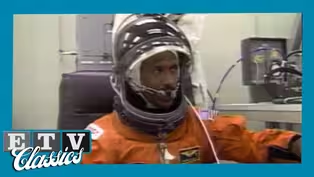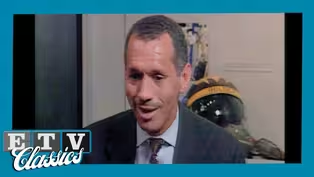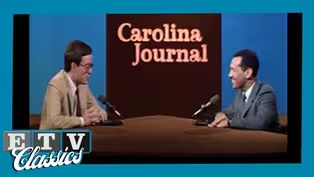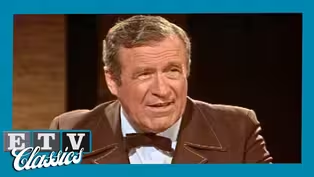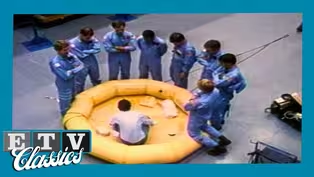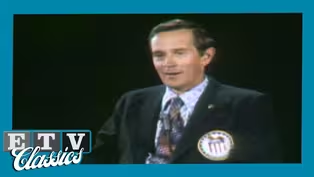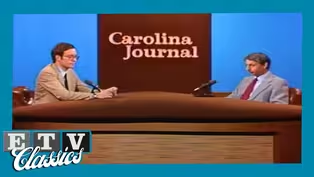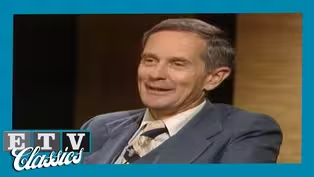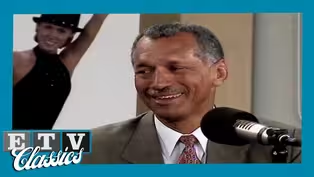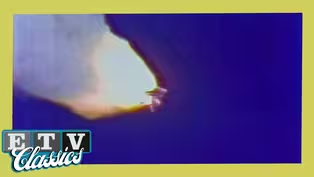ETV Classics
Profile: Charles F. Bolden Jr. | Carolina Journal (1986)
Season 14 Episode 4 | 58m 59sVideo has Closed Captions
A special look at the extraordinary legacy and life journey of astronaut Charles Bolden.
Carolina Journal presents a special look at the extraordinary legacy and life journey of astronaut Charles Bolden. His journey from the segregated south to the platforms for NASA’s shuttles is a testament to his perseverance, faith, and leadership that has proven him to be a trailblazer for aspiring Americans everywhere.
Problems playing video? | Closed Captioning Feedback
Problems playing video? | Closed Captioning Feedback
ETV Classics is a local public television program presented by SCETV
Support for this program is provided by The ETV Endowment of South Carolina.
ETV Classics
Profile: Charles F. Bolden Jr. | Carolina Journal (1986)
Season 14 Episode 4 | 58m 59sVideo has Closed Captions
Carolina Journal presents a special look at the extraordinary legacy and life journey of astronaut Charles Bolden. His journey from the segregated south to the platforms for NASA’s shuttles is a testament to his perseverance, faith, and leadership that has proven him to be a trailblazer for aspiring Americans everywhere.
Problems playing video? | Closed Captioning Feedback
How to Watch ETV Classics
ETV Classics is available to stream on pbs.org and the free PBS App, available on iPhone, Apple TV, Android TV, Android smartphones, Amazon Fire TV, Amazon Fire Tablet, Roku, Samsung Smart TV, and Vizio.
Providing Support for PBS.org
Learn Moreabout PBS online sponsorshipMore from This Collection
South Carolina is home to astronauts Charles Duke, Ronald McNair, and Charles Bolden Jr.
South Carolina in the Space Age | Palmetto Specials (1991)
Video has Closed Captions
A look back at the experiences of Charles F. Bolden Jr. and his rise to becoming an astronaut. (18m 50s)
Conversations with Scientists and Astronauts: Charles Bolden, Part 1 (1998)
Video has Closed Captions
Learn alongside students as they ask astronaut Charles F. Bolden Jr. questions. (19m 1s)
Colonel Charles Bolden: Aftermath of the Challenger | Carolina Journal (1986)
Video has Closed Captions
Colonel Charles Bolden offers a candid reflection on the space shuttle 'Challenger' disaster. (27m 50s)
Space Shuttle: Delays & Possibilities for the Future with Dr. LeConte Cathey | Open Line (1981)
Video has Closed Captions
Dr. LeConte Cathey discusses satellites, the space shuttle, and maintaining technology for space. (28m 47s)
South Carolina Astronauts | Venture (1986)
Video has Closed Captions
Learn more about the firsthand experiences of astronauts Charles Duke and Charles Bolden Jr. (6m 51s)
Kennedy Space Center: Apollo 16 Launch | Nine30 (1972)
Video has Closed Captions
An in-depth look at the launch of Apollo 16 as well as the legacy of the Kennedy Space Center. (30m 6s)
Journalist in Space | Carolina Journal (1986)
Video has Closed Captions
Host Tom Fowler interviews Jack Bass, a member of NASA’s Journalist-In Space project. (27m 52s)
General Charles Duke | Open Line (1983)
Video has Closed Captions
Host Tom Fowler interviews Apollo 16 astronaut Charles Duke about his career with NASA. (28m 50s)
Brigadier General Charles Bolden Jr. | Xpress (2003)
Video has Closed Captions
An interview with former NASA administrator and astronaut Charles Bolden. (26m 45s)
Shuttle Challenger Accident | Carolina Journal (1986)
Video has Closed Captions
Host Tom Fowler brings the breaking news about the Space Shuttle Challenger to South Carolina. (29m 38s)
Providing Support for PBS.org
Learn Moreabout PBS online sponsorshipA production of the South Carolina Educational Television Network.
Sheila Johnson Chaney> Good evening.
The documentary you're about to see about Charles Frank Bolden Jr. was produced in February.
Since then, South Carolina has suffered the loss of two members of its astronaut corps, Ron McNair in the tragic Challenger accident and Steve Thorne in an ill fated airplane crash.
Words cannot express the deep sense of loss that we feel for these valiant men.
We offer in tribute, a look at the making of an astronaut.
Ordinary men in pursuit of big dreams.
Charles Bolden> When we were stationed in Los Angeles, California, and NASA came out and said, hey, we're looking for people that want to fly the space shuttle.
And they had all the requirements written down.
And on paper, I was qualified, but I chose not to apply because at that time I thought astronauts were supermen.
>> I had always told my children that nobody was better than they were.
And I tried to instill that in them.
And I think he believed that.
And whatever anybody else could do, he could do.
Alexis "Jackie" Walker> We never thought t he was going to take, because I don't think he had intended to stay in the military.
One, when he went to the Naval Academy or had intended to be a pilot.
Once he graduated, or intended to be a test pilot.
And all of these were just things that happened.
Whatever he did, whatever he decided to do, he's got to be really good at it.
Warren Bolden> I'm proud of Charles.
I'm truly proud of Charles.
Being in his shadow, coming up behind him, doesn't, it doesn't bother me anymore.
At one time, it did.
♪ ♪ Sheila> Astronaut Charles Frank Bolden, Jr. Has come a long way from this launching pad on the 2100 block of Barhamville Road in Columbia, South Carolina, to this one at the Kennedy Space Center in Cape Canaveral, Florida.
Born on August 19th, 1946, Bolden spent his childhood among friends and close knit family.
His mother, Ethel, was the librarian of the neighborhood junior high.
His father, Charles Sr, was a coach of a local high school down the block and his brother Warren, four years his junior.
There was a different pace of life growing up in the 50s.
A more simple natural life.
It was a time of traditional family values, and for the Bolden family, it was no different.
Ethel> We tried to give him the proper surroundings.
A basis, founded on the Christian religion, place where he could study without interruption and the chance to make a choice.
We never said to him, you must do this, or you must be that.
The choice was his and moral values.
Just the way we live.
Just ordinary people.
Sheila> It was a time of accountability.
Charles> You couldn't do anything and get because everybody knew your parents.
And, so you didn't try.
Except sometimes.
(laughs) >> We were in Boston, and, being the curious person he is, you know, in houses in Boston, all built with, basements.
And, we were outside playing, and my father had gone down into the basement and, he was, working on the furnace that was in the basement.
And Charles heard all these noises coming out of the coming out of the basement.
And he kept saying to me, come on Herb.
Come on, Herbert, let's, let's go down, find out what's, what's going on.
Well, as the houses have a coal chute that opens up, they only open up inside in the basement.
So the so that the people can come and put the coal into the basement so you can put it in your furnace.
So Charles decided that the best way to sneak up on this noise and find out what it was, was to go through the coal shoot.
So he and I, he finally convinced me I really didn't want to do it, because I wasn't interested in finding out what that noise was down in the basement.
And my father kept tapping on the window on the on the side in the basement.
So finally, Charles convinced me to go, and we went around and, Charles went first and slid through the coal chute and down the chute.
And as soon as he got into the, the, the door and the chute and down, my father came out and scared him.
And I can remember Charles saying, oh, mama, daddy, somebody please come and help me.
And he's trying to climb back up out of the chute.
But, but that's the way he was.
He can keep going after another.
Another adventure, another experience.
And he would always, you know, be trying to find what's on the other side.
I always say, you know, he's always looking to see what's on the other side, but that's the kind of person he was when we were, when we were growing up.
Faye> Hot summer nights, his parents would be sitting on the porch and my parents would sit on the porch, but then the children would join each other out near the street, or we'd sit on the sidewalk or Charles had some steps over on his, and we would sit out and look into the sky and talk about the stars, count stars and wonder what was there.
And we did that many nights.
Sheila> It was during this time that the family would make annual trips to Fort Jackson's Armed Forces Day, and Charles Bolden got his first exposure to the world of aviation.
Ethel> He was always interested from a little child, and he made airplanes and things like that, but nothing that would lead me to believe that he would be an astronaut.
Nothing like that.
Sheila> We've seen pictures of your dad taking you to air shows.
Did not that have an impression on you?
Charles Bolden> I think it did, but, a lot it was just that, that stuff was not in the realm of possibility for, you know, a young Black growing up in Columbia.
Sheila> What was Charles like growing up?
Ethel> A regular boy.
He, he was, always active, very active, and still is.
He, loved to swim, to play, to experiment.
He loved school, and he loved his teachers dearly.
Charles> I remember all my teachers, belie And I remember Ms Reese more than anything else, pinching you in the ear and stuff like that.
But, and I remember some, all of them really good teachers.
I think one that stands out more than anybody else is Mrs. Cherry, who was, has always impressed me because, she didn't take any guff from anybody.
She was a very attractive lady who, had no trouble whatsoever out of any of the bullies.
She I can remember one day when she just grabbed the guy by the scruff who thought he would take advantage of a f and, just put him right in his place.
So I had good memories of Carver.
Dr. Verna Cherry> Charles was an unusual student.
He was a leader in his class, but, he did not allow me to push him so far that he was not one with the class.
I recall one experience where when we were studying.
And that was fifth grade, where we do the, social studies on the United States.
And we were studying the, we had studied the Atlantic coastal states, and the class decided to write and do a little skit on the Atlantic coastal state, states.
And, Charles and a group of boys built an airplane, lifted up all the, stage with some boxes, and it was built with boxes and, Charles was a pilot.
It was important for him to be liked and and, and to be a part one with his peer group.
Not that I, not that ever.
I think he would follow them if they were not going in the right direction.
But he did not want to stand out and leave them behind.
The it was important, I think, to him to be a part of the group.
Sheila> After Carver Elementary School, Charles attended W.A.
Perry Junior High, where his mother was librarian.
He didn't come by the library, He didn't want to, but he did.
He, you know, he came when he had to, but he did not hang around, Mother.
No.
Charles> That's where my mom was a librari That was my first experience in a school with one of my parents on the staff.
Again, that was where my wife and my now wife and I, had our toughest time because we had gone to separate elementary schools after being together at Bethlehem Center in kindergarten and, when we came together at Perry, we were arch enemies.
I think at that time she was my cousin's girlfriend or something.
And so we fought all the time.
So that's my biggest memory of Perry.
So I was one of the students and one of my sections.
A.J.
Lewis> And I would wonder sometimes, now, what can I do with this class when I go to the office.
One day I decided that I would leave Charles Bolden in charge of the class, and when I returned to class, I found the class was in just as good an order as it was when I left.
From that day henceforth, whenever I had to leave class, Charles Bolden had charge of my class.
>> Charles, as a student at the eighth grade at W.A.
Perry Junior High School, was a very talented student.
I had a lot of interest.
I had a lot of energy, and I'm very happy that our lives crossed.
Charles was an excellent student.
He was challenging to teach.
He was an inspiration to teach, and we both learned from each other.
He gives me credit for giving him a lot of role model indicators and sort of inspiring him to become interested in science, and I'm very pleased that he gives me that credit.
And I'm honored indeed for that.
Charles> I remember two young men, Mr. Lindbergh Jeffcoat and Mr. James P. Neal, who were respectively, math and science teachers of mine in junior high school and who launched me on what turned out to be an endless pursuit of enjoyment in math and science.
♪ Sheila> Quite a few of Bolden's leisure hours were spent swimming at Drew Park and competing on the park swim team.
T.S.
Martin> Charles took to the water pretty quickly.
He was a plucky little eager youngster and at an early age, It wasn't very long before he started building his strokes and wanting to learn more and more about swimming, to the point that as time went on, he developed his life saving skills.
So at age 15, the earliest age when he could become certified, he became certified in life saving.
And from there he went on to serve as a lifeguard here at the pool.
There were three people who swam in his ag Three, who always stood out.
"Dickie" Artemus, Talmadge, Dickson and Charles Bolden.
And they pulled for each other in every meet.
And we swam against teams in this state.
And some teams in Georgia, Athens, Atlanta.
Two or Three teams out of North Carolina.
And they always came in one, two, three.
And, so long as one member of the team came in first then they had this one, two, three, they were all satisfied.
Charles> I think that was my first taste of, of being able to do something that we weren't, we as a people weren't supposed to be able to do, you know, nobody ever expected to see a good swim team come out of Drew Park, out of a, a Black community.
Everybody knew we couldn't swim.
Because every time we get in the water, we sank.
Well, we had the best, one of the best swim teams in the state of South Carolina.
We never had an opportunity to prove it because, you know, integration hadn't come along then, but you could always compare your times.
That's one thing about anything, like swimming or track or other, time tested events.
You can always compare your times.
And we did very well time wise.
"Dickie" Artemus> You know, we used to sta you know, get around 9:00 when the pool closes.
Some time practices after the pool is closed.
Then, you know, I'll go home.
He'll go his way on home.
I used to go by his house, because his house was closer to the pool, Then I have to go home, and then, you know, back then there's a pretty racial thing then.
It was okay for the White to go to the black neighborhood, but it wasn't too well for a Black to go to a White neighborhood out there.
after a certain hour.
And we'll have eggs thrown at us.
I had some eggs hitting my chest, you know, just coming home from swimming practice, but it's things are changing.
Sheila> Charlie's swimming lessons proved invaluable.
One Saturday afternoon at Columbia's Broad River dam, Herbert> We were out walking across the dam, and all of a sudden the water started rising.
Washed my, one, my cousin, Charles, not Charles Bolden, but Charles Eugene, as we called him, washed him over the dam.
Charles dove in, swam after him, pulled him out of the water.
I can remember that just as vividly as...it was yesterday.
Sheila> Columbia's C.A.
Johnson High School was Charlie Bolden's next stop.
Dr. C.J.
Johnson Jr.> Charlie was a very l Everybody I knew liked him.
All of his classmates liked him.
His father was coach of basketball and football at Johnson, but nevertheless, he was not arrogant.
The students loved him because he was one of the group.
But back in those days, you know, We had a philosophy that in spite of the handicaps that confronted you, if you work hard enough, you could overcome those handicaps.
Our philosophy was, we will either find a way or we'll make a way, because there was something about a Johnson student would make you strive to be the best.
And Charles Bolden was a leader, with that philosophy.
He would strive each day to be among the best.
He's a wonderful student in mathematics.
He's wonderful in chemistry.
I can remember when Charles participated in the science fair projects.
Oh, he wanted his to be the best, and they were exceedingly good, because he polished them up.
And these were not things that were done by somebody else.
He would work long haul hours at these things.
So that when they represented in the fair, that they would say, this is a wonderful project.
He still just did another science project.
Nah, he's been in science projects all of his life.
Ms. Hollis Davis> When I think about Charles, Charles was, well-rounded.
He participated in the student council.
He was active in a number of organizations at the school.
He was well liked by the student body and, definitely Charles had fortitude, endurance and determination.
The newspaper staff is probably where I knew him best, and I think that he was a source of inspiration to the students in encouraging them to... seek to put out a paper that was representative of a school, like C.A.
Johnson High School.
Charles> That was my second experience.
That was when I was with my dad and, had the privilege of playing football for him.
Ethel Bolden> He enjoyed having him as coach, but there was always that feeling that, maybe if I were not the coach's son, I would have a better chance because I think he felt that his daddy thought if you went in and made a mistake, you know, his mistake would be greater than anybody else's mistake.
And that's understandable.
"Dickie"> When we went down to, Charleston, when we played, a championship game in Charleston against Burke High, we beat them 25 - nothing to be exact.
And, I went to him one time to really try to, for him to console me a little bit that, his father picked me to be the starting running back in that championship game, which I've been basically playing defense all the time.
And I went to Charles, saying, "what's your daddy doing?"
You know.
(laughs) And, Charles said, "Don't worry about it.
"He know what he's doing."
Charles> And I can remember, people calling and asking my aunt, my dad's baby sister to get him to clean his mouth up.
up there on the hill sometime, because the strong language he used with us, - I can remember I struggled to play football for my father at C.A.
Johnson High School in a number of his tirades as head football coach, he would all always call us together, and when we would get down.
And one of his favorite sayings was, it's not the size of the dog in the fight, but the size of the fight in the dog.
Sheila> Following graduation from high school, Bolden was accepted at the United States Naval Academy at Annapolis, Maryland, but the road from Columbia to Annapolis was paved with obstacles.
Dr. C.J.
Johnson Jr.> We, at a time, were wondering whether he would get there, who would endorse him.
We didn't have anybody in the South to do so.
But there are many people who came to our rescue, and there was a gentleman in Charleston who knew somebody in Washington, a congressman from a northern state, who said to this gentleman in Charleston, "I'll get you some endorsements."
And he did.
And we'll forever be grateful.
To that gentleman out of Charleston, to that congressman, out of the northern states, for saying, "Send us some more."
And that year, when he was accepted at Annapolis, we had a student accepted at West Point, and one for Air Force Academy.
Sheila> And in 1963, Bolden was barred from taking the Naval Academy entrance exam at the University of South Carolina.
Ethel> Well, we have we had applied for him to take this examination.
And, when he appeared, well, it was apparent that he was Black and that...different, if you if you want to think of it like that.
And so the person who was giving the exam said, told my husband and me that we would have to go somewhere else and let him make provisions for Charles to take the test in another setting.
And that was very upsetting to us.
>> Well, he told me that he was going to Annapolis and asked if I would write a recommendation, I looked at that kind of skeptical because I don't know whether you know it o but up until that time, Black boys hadn't faired well, in the Navy.
They'd go into quartermaster service or so and I felt that he had too much... ability.
But he persisted, and I wrote the letter, and I was very glad when he made good, too.
Lil Chase> The hotels were, wasn't open to Blacks.
The theaters, or none of the public places.
So my mother and I just felt as though we wanted to do something to help those who were struggling for higher education.
So we just opened our doors to "middies" and our local fellows also, because I, we help each other.
It was just such a pleasure to, welcome them and they became family.
Charlie's always a happy go lucky fella', and you can tell what type of home he came from because he was very respectful and lovable.
Always smiling.
Always.
When my mother passed, there were about 12 others and they put their career on the line because it had never been done before, that the "middies" be a pallbearer for someone you know in the civilian life.
And, they had gone to the commandant, superintendent, chaplain and whatever, whoever, you know, that in line that they had to go to.
And the morning of my mother's funeral, the undertaker asked, where did we want the "middies" tonight?
"Where do we want them tonight?"
And I said, "What do you mean?"
He said, "They all are out today for your mother's funeral."
And they said, she is responsible for us being here, for her, opening her doors and welcome us during the hard times.
And, I'll never forget them.
Any of them for their kindness.
"Buddy" Clark> Charlie would always clean before we would go out.
He would, he would always go out at the same time.
So, I mean, he was he wasn't abnormal in terms of being studious or real military, but he always took care of his obligations Henry Shaw> When I was, I guess, a sophomore, I'm from a big family.
and going to the academy for me was was a thing of a great deal of pride.
But being from a big family, I didn't have a whole lot of money to go anywhere, let alone the Naval Academy.
It didn't really make any difference.
Didn't have a lot of a lot of clothes or much of anything to go to school.
Charlie pointed out to me that the Naval Academy, it wasn't about what you owned, it was about what you did while you were there.
The first weekend that we had, off campus, we went down to Hampton's homecoming.
Charlie introduced me to a number of young ladies that were there at Hampton, loaned me his clothes so that I'd have proper attire outside of the military to wear.
At one time, Charlie even introduced me to who was Miss Johnson C. Smith.
Small things, but things that...mean a lot to you when you, when you're trying to make it.
Leo Williams> The weekends are the only ti that you get not to sit at what is called your company table.
While on the weekends, the upperclassman Charlie and Buddy and Frank and some of the guys that you've talked to already set up a special table, so that we wouldn't have to put up with the harassment for two days a week and it meant a tremendous amount to us, because just...that camaraderie and that kinship, allowed us to let our defenses down.
Ethel> When I left him at the academy.
And, you know how that during parents week And it just seemed that it was just, as I said, a sea of white that I was leaving him in, and he was just a tiny dot, you know, because there were I think there were just about ten other blacks and, oh, so many, other races there.
And I felt like he was just lost.
But he made it, you know, that's about the thing I remember most.
Yeah, he made it.
Sheila> Marriage was next on the agenda for Charles Bolden, and he married his childhood sweetheart, Jackie Walker.
Charles> Like anybody that manages to, to stay together for any period of time.
Yeah.
You don't always agree.
In fact, we very seldom agree on a lot of things.
But, you generally try to try to talk them over or, sometimes that doesn't work.
So you just, you know, go into separate rooms or something, like we all do, which is the wrong thing to do.
And then after a while, we get back in there and talk.
Is that right?
Jackie> That's right.
I think a lot of it has to do with understanding, that nothing is easy to do and it does have to be worked on.
It helped a lot when he went in the Marine Corps.
He happened to have a real good C.O.
and his wife was excellent at bring a lot of, young wives in and just telling us basically what type of lives we were going to have to lead, if we were to marry military people, because they are traveling all the time and they work long hours and, basically on call 24 hours a day.
And so they would spend an awful lot of time away from home and from the family.
And you don't have to like it all the time, but at least we have an understanding of what's happening, you can make adjustments and pretty much do your own thing.
And I think I mentioned before, it's good to have a life together, but it's also good to have a life of your own.
Charles> It's essential.
Jackie> Yes.
That you have something that you are very involved with and not live through your spouse's.
It's very hard.
Most couples that do that don't stay together very long.
Sheila> Upon graduation from Annapolis, Bolden accepted a commission with the United States Marine Corps and after a tour of duty in Vietnam, became a recruiter.
Announcer> What's it take to go to the top?
Ask a Marine.
Charles> Practice, practice, practice- and the discipline and skills I learned as a Marine officer are helping me master the skills I need to be a NASA astronaut.
If you're looking for a chance to test yourself to see just how far you can go, look into the United States Marine Corps.
It could be your ticket to the stars.
Announcer: Find out.
Maybe you can be one of us.
The few, the proud, the Marines.
Sheila> While Bolden's military career was his brother Warren's was taking a different path.
Warren> A lot of guys were being sent to Vietnam, and I just didn't feel that I was ready.
And I made that known to some of the other guys that were there with me.
One guy told me the best way to get out of the service was to be involved with drugs.
And I went out with him into the streets of Augusta and started buying drugs.
I did this for about 2 to 3 weeks and went and turn myself in.
They put me in an outpatient clinic and gave me methadone.
They got me higher than any drug that I've ever had.
I got put out of the service about three days before Christmas in 1970, and came back to Columbia.
I couldn't get a job, and I went back to the streets and, continued using drugs.
And I've just been messed up with them ever since.
In order to support my drug habit, I had to do illegal things.
And I never hurt anyone.
Do it.
I broke into people's houses.
I guess people were hurt when they came home to find most of their possessions gone.
But that didn't really matter to me.
I just knew that I had to get money to get the drugs that I needed.
And that's what I did.
Charles> It's... the greatest example of how you can have a set of parents who do the best they can with two kids and, and they just come out absolute opposites.
He is now still in the, in the penal system in South Carolina, right outside of Columbia.
All you can do is you pray and you pray that, that someday, it will...the importance of, of doing things right or the acceptable way will come to him.
And, you know, my brother was a tremendous guy.
until he just lost control of his of, of himself.
And I just think he, you know, he he doesn't to this day, I think, understand some of the things that he does and he does things that just aren't right.
But it's no big deal.
And that's why I, I really talk to try to talk to young people about staying away from drugs.
And, and it's something that, you know, if you've seen what it does to people, you can understand it.
And a lot of young people haven't seen it.
They don't believe it will happen to them.
Ethel> They're two different people.
And you can't let Charles, Charles can't let this stop his life and his...ambitions.
And yet he, you know, when he, he clouds up every time you mentions, as you perhaps saw.
But, there's, there's little that he can do about it, but, help other people not to make the same mistake.
And, all of us have dedicated our lives to doing that, to saying to young men and young women, you know, this is not the way.
And, if we can do that, I think we do more than, than, just sitting around saying, I'm sorry, you know, that kind of thing.
If I can't save my own, I can save dozens of others by saying, don't take this turn, you see.
And I never fail to say that when I go, when I go somewhere to say something about Charles, I always say, you know, there's another road you can take too, And, I still, you know, you can do that and still love you, love them with all your heart.
And that's what I do.
Warren> I'm trying to develop self-esteem, to feel good about myself.
It's hard to do under these circumstances.
But...I'm preparing for the future.
I'm trying to overlook right now, today, and prepare for the day that I leave here and go back to the street.
Sheila> In 1980, when Bolden was accepted as an astronaut candidate by the National Aeronautics and Space Administration, Charles, Jackie and their two children, Che' and Kelly, moved to Houston, Texas, where Bolden began his training at the Lyndon Johnson Space Center.
Frank Hughes> Well, Charlie and I have been working together ever since he's been here.
in various degrees, either in the simulator or just socializing around the area here and, he's just a prince of a guy.
I can't say enough about the way he works as a pilot.
He's very, very good.
Okay, aside from being a super athlete, we were talking about staying in good physical shape before.
He, certainly, is, you know, a jogger and does all the things that you'd have to do, stay in good physical shape.
As a pilot, he'll be, flying right seat on this flight, and, he's just, turned out to be really, a good hand on the stick.
Sheila> But what made Bolden want to be an astronaut?
Charles> It seems to be a natural progression from the things that I've done.
I went to the Naval Academy because I thought I wanted to be a naval officer, and in my four years there, I became very impressed with the Marine Corps because of the people I met there.
So I chose to become a marine, a Marine Corps officer.
Since then, I decided I wanted to go to flight school and learn how to fly.
And, I had not, you know, I had no reason to want to do that because the only time I'd ever been in an airplane other than a commercial airplane was with Mr. Norman Pendergrass back in Columbia, down at Owen's field.
And I think I flew with him one time, and I was real young.
Norman Pendergrass> On this particular Sun I can recall very vividly his father, his late father, Coach Charles Bolden, who was beloved by everyone, made the statement that he was not going up in that little plane, but little Charles could go if he wanted to.
So, little Charles and my son, incidentally, got in the plane and we strapped them in and took them up.
And the amusing thing about it was, for the 15 minutes that they were in the air, the two kids laughed.
They giggled.
They pointed out of the window.
They enjoyed themselves thoroughly.
Charles> That didn't put a spark in me for flying, but after I came in the Marine Corps and went to flight school, I fell in love with that.
And early decided I wanted to be a test pilot.
And so I tried a number of times to get to go to test pilot school, and finally got selected to go there and went to test pilot school, finished, and then became a, you know, a Navy test pilot or a naval test pilot.
I really enjoyed the work I was doing in Patuxent River, Maryland.
It was exciting.
Lots of flying.
Stayed in an airplane.
Some of it was, thrilling, but, that just didn't seem to be the ultimate, because we were doing a lot of systems test.
And I learned about the space shuttle program and decided, what the heck, may as well give it a try.
And I was fortunate enough to get an opportunity to interview.
I guess they were sufficiently impressed w that they decided to let me come down here and join the program.
Sheila> How did you feel when Charles first decided that he wanted to be an astronaut?
Jackie> I was very excited about it.
It seemed like the logical step for him in his career.
Having done many things that he wanted to do, he was a test pilot at the time he applied down here.
And it just seemed like the logical step, and I was very excited for him.
It happened at an unfortunate time when they were selecting, when he placed his application because his father died.
But through all of that, he went through with the application and everything he needed to do.
So we were real excited, a little upset because his dad wasn't around to enjoy him being selected, but very excited that he had an opportunity to come down here.
Charles> He almost made it.
He, my dad died, five years ago.
In fact, when he died, I was in the final phases of filling out my application for the astronaut program, and, It would have been nice to have him see some of it.
Sheila> In addition to his role as astronaut, Bolden is also a lay leader in his Episcopal Church and a coach of his daughter's soccer team.
Charles>...you're sticking your hands up, try to keep them out of the way.
Okay?
If you have to do anything, just put them out alongside of you.
...keep it up.
Get it out.
Let's go.
Player #1> Okay.
(Indiscernible conversation) Charles> Okay.
Good.
Keep your leg... Come on.
Follow it up.
Go!
Get it...
There you go Hit it, Crystal.
There you go.
Good, good, good.
Sheila> What do you think makes Charles a good husband and a good father?
Ethel> Well, he's, he's, he had the, example of seeing a good father.
His father was, was one of the best.
So he grew up with that.
And, I just think that he never thought an except that, this is the way it should be.
It's, it's a give and take affair.
And, of course, I admire Jackie, because, his wife, because she has an awful lot to deal with.
Because, you know, he goes and comes, when they are together.
It's a quality life.
Jackie> He does so much for his family and People love him.
And sometimes I resent that.
You know, all of a sudden you're some place and people tell you how wonderful he is and it's true, sometimes you can resent it, and sometimes I do, and we talk about it at home.
But, he's a very outgoing person.
He's a very caring person, and he's a very religious person.
And all of those combined make him just fantastic as far as we're concerned.
Che' Bolden> He helps me a lot with my school stuff and supports me in everything I do.
And, and I and my hobbies.
He does those with me also.
Sheila> Are you concerned for your father?
Are you excited for him?
>> Yeah.
Real excited.
Sheila> What excites you the most?
Kelly> Well that he's an astronaut and that he's famous.
Jennifer Radik> He always participates in and a ball game does not go on that Charlie, if he's in town is there, and Jackie also.
They're very supportive of their children, which today I think is a very big plus.
Father Calvin Sachers> He has a gift where he is, sincerely interested in other people.
He has, a compassion that comes through and people know this and they relate to th and this is why they love him.
And this is why he has certainly one of the reasons why he has so many friends and, and they think so much of him, Charles> You know, there are ...a lot of different Charles Boldens, there are the way that I perceive me and there are the way that I perceive other people perceive me.
And I like the way that other people seem to see me a lot better than I, than I do myself.
But, I see myself as a as a competent, intelligent, general kind of person who is, who is willing to work, who likes to have fun, you know, but it's by no means, very smart, or all knowing about anything, really.
I don't mind telling, you know, I know I always make mistakes.
But I think one of my strengths is, is in being able to say, hey, I really screwed up, or I really made a mistake and, and sharing that with people, because, like, I tell kids, I think my generation has done them an injustice, by trying to take the word failure out of the I guess out of their vocabulary, at least as far as I see it, I think we did them an injustice by making them think that they had to be successful in everything they did, and they could never fail.
And what I tell kids now is that, hey, I made a mistake in telling you that.
And my generation has made a mistake in telling you that, that failure is of utmost importance in growing up.
It is the only way we learn.
And again, I think, you know, in describing me, that would be my probably my greatest strength.
Is that, it doesn't faze me to fail.
There are three things that my parents, three basic things that they left me with or that they gave me when I left the house, the home.
One was a respect for authority, and that, that just kind of follows through with my, my being in the military and everything else.
Another one was a real strong desire to learn, you know, just a thirst for knowledge.
Just, just try to learn as much as you can.
But foremost was a good, firm faith in God.
And, that is what has taken me, right on up to today and I think will continue to take me no matter where I go.
And that is something that, I'm never embarrassed to talk about.
I don't go and, you know, get up on the bench and start yelling and screaming about it, because I don't think I have to.
In my dealings with people, I, I try to, I try to live the way that I think, you know, the scripture tells you to live.
I don't do it very well, but, a lot of times, but, but that's the thing that, that gives me my strength, and I, you know, and everything I am, comes from God.
And I realize that.
Sheila> Do you have any idols?
Somebody that you look up to?
Charles> My dad and Che'.
It's, I think it's it goes, you know, it's, it's very easy for people who, for people from Columbia to understand how I would I would idolize my dad because they knew him and, and a lot of, a lot of them knew him, for a lot longer than I had the opportunity to and probably knew him a lot better than I did because they, you know, they weren't being disciplined by him or, or they weren't loved by him as much as, as I was.
My son, I look up to because, he is so much more aggressive, so much more confident, and, than I considered myself to be.
And, you know, I don't think there's anything that he won't try.
And, and I admire him for that.
Sheila> What about your being Black?
Charles> I realize that it's not, it's really not, no big deal, like I would like to say.
I'd like to say it's no big deal.
But it is.
But I don't think it's all the big deal that, that a lot of people like to make it out to be.
I think the time has long since passed.
That just because you're Black, you're not going to be able to do something or, or somebody is going to not let you do something.
There are still people who don't want you to do it, but unless you allow yourself to be stopped, they can't stop you anymore.
Some of the angriest moments I've had here in Houston in the five years I've been here, have been internally angry, have been when I walk into Mission Control, and, there are no Black controllers.
There are now.
But when I first came down here, there were no Black flight controllers on console.
There were plenty in the back rooms, but, but they just we just didn't seem to be able to break through and get out on console.
And now there are a few.
But, you know, that's, that's kind of frustrating.
And the fact that there that we have had two additional selections of astronauts since I came down and, and no Blacks in either of those two groups, that's, that's disappointing and frustrating and it makes you angry, but, you just kind of bite your lip and, and, see what you can do about interesting people in applying because, I know, you know, as much as people like to blame NASA, it is not NASA's fault.
There I was in 1978, and I refused to apply, and I was fully qualified, and I, you know, I didn't have anybody to blame but myself.
And I guess as a people, we just have to realize that, hey, if there are no, you know, no more Blacks in the space shuttle program than, than there are.
And we think we want more and are going to get out and encourage youngsters to go into science and engineering and, and get them to apply.
Sheila> After five years of rigorous train Bolden is finally assigned to pilot the Space Shuttle Columbia, scheduled for launch December 18th, 1985.
What are you thinking about as you prepare for the launch?
Charles> How much I don't know.
That's easy to answer.
I am very confident in my crew and I am, confident in myself, maybe because of my crew.
But it is just mind boggling how much you really don't know about the space shuttle.
It is, it's such a complex machine, you know, and that, you know, that part of it, you think about all the time.
Reporter> This is your first flight.
I'd like to know, how are you feeling about it?
And, also, for the benefit of the folks back home, what articles are you taking from South Carolina, and how are those articles selected?
Charles> I'm feeling pretty excited about flying.
That's, I guess, an answer to the first part I am carrying, a number of articles from mostly from high schools in the Columbia, South Carolina area.
I grew up in Columbia.
So if I can remember some of them, I have a pennant from Spring Valley High School.
And, a little pendant from W.A.
Perry Junior High School where I went to school, from C.A, Johnson High School, which was my alma mater.
I have a, football cushion.
And, from W.J.
Keenan High School, where my dad was the athletic director before he died.
I'm flying a miniature of a, of a plaque that goes to the outstanding athlete each year.
...Benedict College, which is where my mother in law went to school.
(laughing) I think...we're flying a, were flying the president's seal, which is a small medallion.
And, I hope that's it.
I hope I have not left anyone out.
Sheila> Due to technical and weather problems, the launch is delayed numerous times.
Dispatcher #1> We have cut off.
Dispatcher #2> We have a cut off.
<Dispatcher #1 speaks> Dispatcher #2> We had a cut off at two minutes, 14 seconds Launch sequence for safety is in progress.
Jackie> We, we had that built in that NASA wasn't going to let that shuttle go until everything was right for it.
And so we just had to sit and wait.
Sheila> You talked to Charlie on a regular basis on the days?
Jackie> Every morning.
My wake up call was at 315 in the morning, and he would tell me he was on his way out to the launch pad.
And of course, I didn't want to make him feel that I was the least bit sad about it, so I had to just keep my, you know, keep my nerves up and, and just urge him to go on and do the best he could.
Charles> Determination is to what actions, if any, need to be taken, concerning this, problem that occurred this morning, before we can make another launch attempt.
Sheila> Finally, on January 12th, all systems were go.
Charles> We did lift off, I think about 65 And, as a first time guy, I must say that I thought, who, and the other experienced guys had me quite well prepared for what we were about to encounter.
You know, it seemed pretty calm and collected there until the main engines lit and I got a slight glow off the, from the outside.
But when the solid rocket rocket boosters ignited, I knew that I was in for a rude awakening.
That all my preparation, you know, I don't know where it was going to stand me in good stead or not.
We, did the roll program and right away got an alarm.
So that put me at ease, because I thought right away.
"Oh, it's just like being in the simulator."
And that set the tone for the rest of the ascent.
It was very, very impressive, as a first time, flier.
We lifted off in darkness and then started seeing sunlight almost right away.
When we got heads down, we finally got to an altitude of about 61 miles when we had the main engines cut off, and that was almost 8.5 minutes later.
We did have only two alarms during the ascent.
Both of them turned out to be, old sensors.
And no, no real big problem.
The most impressive thing to me about the ascent from a, from a physical point of view was the, the, the force that was exerted by during the 3G throttle down close to the main engine cutoff.
I had planned to do a lot of reach and visibility checks and, and feeling the force on my chest, I just said, well, forget about that.
I'm going to sit here and enjoy the ride there.
You saw the solid rocket booster separation?
People that way at the Cape said that they thought the the launch itself was spectacular.
Tell me when you watch the space shuttle launch, give me your, your reaction as you watched your son sitting up on that launch pad.
What were you thinking about?
Well, my nephew had said to me, that he told someone, how do you think that my aunt won't be here when everything she has is out on that launch pad?
And I said, you know, I hadn't realized that.
But the two people in the world who are very close to me in this, one of them, not that there are other family members who are close to me, but I mean, my children, you know?
And I said, gosh, there goes everything I have.
And but I know the Lord will take care of him.
Jackie> Once you decide that this is something you want to do, and you come down to NASA and you start training and you hear the other guys that have flown, talk about it, and you actually, see what's involved and flying the shuttle and, doing the different maneuvers, you really get excited about it.
And then when your turn comes, I don't think anybody can take the excitement away from you.
So right now what he's running on is a lot of adrenaline.
Ethel> When it finally launched, it was the most beautiful sight, most awe-inspiring thing I have ever seen in my life.
It's indescribable.
It was beautiful.
And, just to see them go and sew into the heavens and to see the booster rockets drop off and into the ocean, and to know that there was somebody there to man every effort that NASA was making.
And it was just beautiful.
Charles> An interesting thing to me about Earth observations was being a pilot.
It it seemed visually like you were flying in a regular airplane, you know, at 41,000 feet or so.
The one thing that reminded you of where you were was the fact that, for example, crossing the United States in ten minutes, I had never been in an airplane that could do that.
So that was the one thing that gave you the rude awakening that you were way up there.
Every time you have a new vehicle, we're interested in seeing how it expands and contracts, when it gets into space.
So what, we're doing right here is actually conducting cabin measurement.
We measured the separation between the lockers, the distance between the floor and the ceiling, and everything else of that nature.
And we do that on each new vehicle.
So Columbia was kind of considered a new vehicle this time, when we redid the cabin engines.
♪ Mars a'int the kind ♪ of place to raise your kids.
♪ ♪ ♪ In fact, it's cold as hell.
♪ ♪ ♪ And there's no one ♪ there to raise them.
♪ ♪ ♪ If you didn't ♪ ♪ ♪ ♪ And all this science ♪ I don't understand.
♪ ♪ It's just my job, ♪ five days a week ♪ ♪ ♪ ♪ A rocket man ♪ Rocket man ♪ ♪ ♪ ♪ And I think it's gonna be ♪ a long, long time ♪ ♪ 'Til touchdown brings me 'round again to ♪ ♪ I'm not the man they ♪ think I am at home ♪ ♪ Oh, no no no ♪ I'm a rocket man ♪ ♪ Rocket man ♪ ♪ Burnin' out his fuse up here alone ♪ ♪ ♪ ♪ And I think it's gonna be ♪ a long, long time ♪ ♪ 'Til touchdown brings me ♪ 'round again to find ♪ ♪ I'm not the man ♪ they think I am at home ♪ ♪ Oh, no no no ♪ I'm a rocket man ♪ ♪ Rocket man ♪ ♪ Burnin' out his ♪ fuse up here alone ♪ ♪ ♪ ♪ And I think it's gonna ♪ be a long, long time ♪ ♪ ♪ ♪ And I think it's gonna ♪ be a long, long time ♪ ♪ ♪ ♪ And I think it's gonna ♪ be a long, long time ♪ ♪ ♪ ♪ And I think it's gonna ♪ be a long, long time ♪ ♪ ♪ ♪ And I think it's gonna ♪ be a long, long time ♪ ♪ ♪ ♪ And I think it's gonna ♪ be a long, long time ♪ ♪ ♪ ♪ And I think it's gonna ♪ be a long, long time ♪ ♪ ♪ Charles> I guess the third time was the charm for us.
We had tried to get down and tried to get down.
And finally, this was real entry morning.
We were able to catch a final glimpse out the back windows of another, sun.
I think this was a sunrise right over the vertical tail.
You can't see it very well, but we had the, shuttle imaging, infrared, test stuff up on the pod.
This is actually the landing itself.
The entry was spectacular.
Sheila> Not every part of Charlie Bolden's life has been triumphant.
Dispatcher> Engines throttling up.
Sheila> He has experienced the death of his father, He has dealt with his brother's drug addiction.
And he's eulogized a friend.
Charles> Brother Ron was leading me throug with Omega Psi Phi.
He helped teach me what perseverance meant because he made it very difficult for me.
And he said, if you don't want it.
If you don't want it, you'll never get it.
He said.
Anything you want, you've got to You've got to stick to it.
And that's what perseverance is.
And I think the final thing that Ron would tell you, the final word would be uplift.
And Ron would look out on this crowd and he would say, everybody here has something to contribute.
Everybody here has some talent, some gift from God.
"I'm really going to be upset", is what Ron would tell you, if you don't use that gift from God and reach down and touch somebody else and bring them up, that's what I think Brother Ron will tell you.
And I guess there's not much else I can sa You know, the rest of you know him and know him well.
Many of you have read about him, never saw him.
But I think he wants you to remember, what it means to be a man.
The value of steady, the necessity to stick to it.
And finally, to remember to reach back and pick somebody else up, when you finally reach a goal that you set for yourself.
Don't cry for Ron because he's okay.
And Ron is really going to be mad if we cry for ourselves.
So let's get about doing the work that Ron would have us do.
You should all have a dream, some type of dream.
And I would ask you if you would persevere in the pursuit of that dream.
Never give it up.
To others it may be ridiculous, but to you it's very important, and it is most important that you see that dream through to fruition, to its completion.
Don't be afraid to take a chance.
Be a fighter.
Be a dreamer.
Stick with it.
Stick through to the end, whatever it is that you pursue.
Never forget from whence you come.
Duplicate your accomplishment.
Then I think that you will feel that your life has not been lived in vain.
Enjoy life, but don't ever forget to look back, reach back and bring someone else along.
♪ ♪ ♪ ♪ ♪ ♪ ♪ ♪ ♪ ♪ ♪ ♪ Sheila Johnson Chaney> Charles Frank Bolden, Jr. piloted the last successful space shuttle mission.
And despite the tragedy of the Challenger explosion and no plans to resume space flights for at least two years, Bolden plans to remain in the astronaut corps and is eagerly awaiting his next mission.
Support for PBS provided by:
ETV Classics is a local public television program presented by SCETV
Support for this program is provided by The ETV Endowment of South Carolina.
